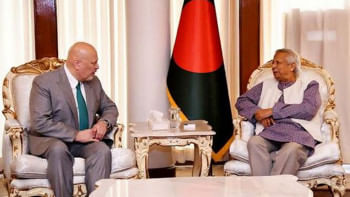Paying for unwarranted confidence-booster doses?

Bangladesh's 'shock' defeat at the hands of Scotland in their opening Group B fixture of the ICC T20 World Cup qualifiers, which came on the back of two losses in the preparation matches against Sri Lanka and Ireland, had created a rupture in the wall of confidence they seemed to have had following series wins against Australia and New Zealand at home. One might even ponder, now more than ever, on whether those series triumphs were pyrrhic victories leading into the World Cup.
Nevertheless, a win percentage of just over 36 percent in the shortest format should have been enough evidence to focus on building mental resilience going into the flagship event. While in below-strength Australia and New Zealand sides, the Tigers had enough of a challenge on their plate to prepare adequately, the management's decision to play on Mirpur surfaces, which were not geared towards actual cricket challenges but tailor-made to create a false sense of security, worked against the Tigers in the World Cup opener and the preparation matches.
Even if the warm-up fixtures are not testament to Bangladesh's failings, how the match against Scotland went away from the Tigers, when Scotland's number seven and eight batters put them under pressure, is something that can be considered as a precursor to falling levels of confidence.
Confidence can be a two-way torrent: One side is the confidence that others have placed on you and another one is your own belief in yourself. In terms of team sports, confidence transmits from one to another and to the whole squad. On the other hand, fear factor or a lack of confidence can also transmit when things do not go as planned.
Bangladesh had taken Mohammad Naim as an opener for the World Cup and the management had, in fact, put their faith in him despite there being evidence that Naim was not doing what was required, which was scoring runs at a rapid rate in the Powerplay. And when the seeds of doubt were sown following the two defeats against Sri Lanka and Ireland, respectively, the team's think-tank resorted to dropping the opener they had earmarked going into the tournament.
If confidence is the key to performance, there was none on offer for Naim from the team management. In fact, if Naim was not going to serve a purpose, the decision, once again, points finger at a lack of foresight.
"Naim's exclusion was a bit of a surprise. The way the team management built him up for the World Cup as one of the main openers, it [his exclusion] was a surprise for me," Tamim Iqbal, who had voluntarily stepped aside from the World Cup squad, said in a local TV show on Sunday.
Nasum Ahmed had also been a key figure in recent series but following the two preparation matches, he too was dropped, perhaps with the conditions in mind. However, it is also a fact that the team management paid little heed to what the team required while playing on sporting surfaces. Suddenly when questions arose regarding Nasum's efficiency on such surfaces, he had to make way for an extra pacer.
Thus, the build-up by playing on such Mirpur surfaces, worked heavily against the Tigers since they began their real preparation. Often, the management has said that they would have to adjust to conditions, somewhat suggesting that these things cannot be planned ahead of time.
However, there is little evidence that such hotchpotch planning could ever get them ready to face conditions where batters play shots freely or bowlers come under pressure due to surfaces being friendly for batters.


 For all latest news, follow The Daily Star's Google News channel.
For all latest news, follow The Daily Star's Google News channel. 



Comments